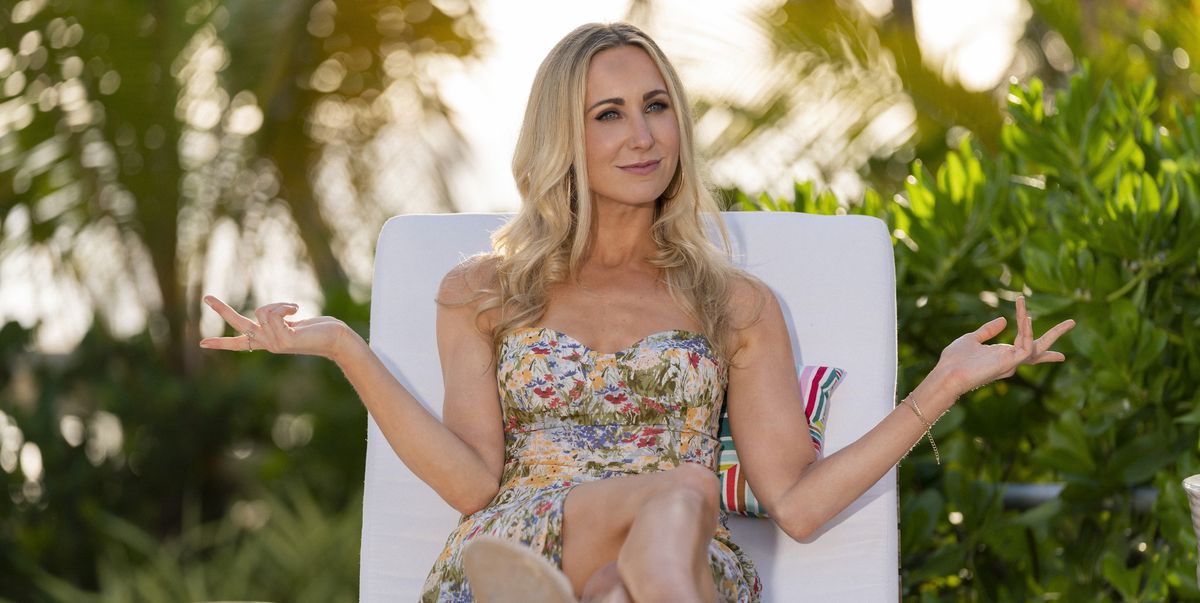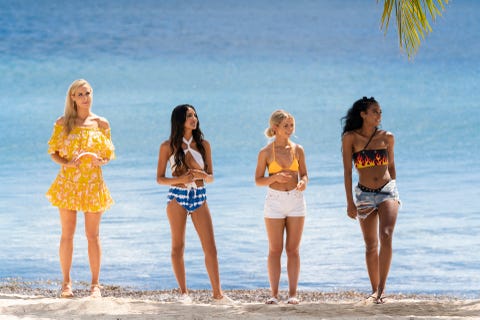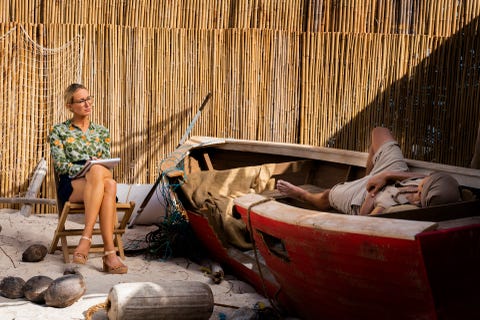Products You May Like
Nikki Glaser has found a home on FBoy Island, and if Hollywood is smart enough, they’ll let her stay there. As host of the new dating show from HBO Max and Bachelor producer Elan Gale, the 37-year-old comedian lends a genuine enthusiasm—and a magnetic self-awareness—to the reality TV gig. In her pursuit, she also joins a cohort of fellow female comedians, including Nicole Byer (Nailed It!), Michelle Buteau (The Circle), and Desiree Burch (Too Hot To Handle), to usher in a new paradigm of entertainment wherein reality shows acknowledge their own absurdity. Instead of masquerading as anything other than complete nonsense, these series let their charismatic hosts—and, by extension, the ravenous audience—in on the fun. “You’re not Breaking Bad; you’re not The Wire,” Glaser says. “You’re a dumb reality show about love.”
FBoy’s concept is both simple and surprisingly clever: Putting the power in the hands of three women, the series pits 24 guys—12 “nice” ones and 12 self-professed “fboys”—against one another as they volley for the affection of the leading ladies (and an accompanying wad of cash). The series is meant as an answer to hopelessly optimistic, Neil Lane diamond ring-centric shows a lá The Bachelor, but with a satirical bite. FBoy Island knows exactly what kind of show it is: raunchy, inane, and more in-line with today’s real dating experiences than anything you’ll find on ABC.
Despite its playful hijinks, FBoy Island is a compelling concept largely because, at its core, it’s not that different from dating in real life. There are your Kevins, your Joshes, your Gregs, your Matts. Some guys are blatantly in it for the perks; others claim pure intentions; still others will take you on a romantic gondola ride down the River Styx. Every once in a while, there’s someone tolerable, who makes what often feels like an elaborate hazing ritual worth the heartache. The challenge, naturally, is figuring out who before it’s too late (and not getting duped in the process).
“We’re actually giving the [leading women] more information [about their dates] than most of us have when we’re swiping on Bumble,” Glaser says. As the contestants play an elaborate game of Guess Who? to whittle down their potential mates, each episode culminates in an elimination from the island. The ejected guests then must reveal whether they’re (self-described as) naughty or nice, so, of course, it’s only a matter of time before all 24 contestants are identified along party lines.
What surprised Glaser the most was that FBoy’s concept—that men can be good or bad, with no in-between—was not as flawed as she’d originally anticipated. Surely, men were more complicated than the series posits? “I went into the show thinking this is kind of a fun idea, but a false premise because people are not one or the other,” she says. “But I learned that honestly it is that black and white.”
A self-proclaimed dating show connoisseur, Glaser worried that the romance on FBoy Island would feel contrived, a rehashing of the same tropes Bachelor Nation has watched unravel for years. But she was surprised to find that FBoy Island’s bifurcated groups incited real authenticity. There’s no point in overcomplicating courtship when the women already know you fall into one of two camps.
For two weeks before filming, the 24 men and three women quarantined solo in their hotel rooms on the Cayman Islands as a COVID precaution, making the impending onslaught of company all the more alluring. Combine the resulting fear and loneliness with the hormone levels of attractive 20-somethings—plus no cell phones or outside distractions—and you’ve got yourself a pressure cooker primed for sparking connections. Fast.
“I didn’t want to force anyone to say ‘I love you’ just to have a better story,” Glaser says. “But these people actually fell in love that quickly. Yes, the environment may have been designed to stimulate these feelings, but the feelings were real.”
Prior to shooting FBoy Island, Glaser was confident she’d be able to suss out the men’s true identities quickly. After all, she’s built her career around her brash honesty and nothing’s-off-limits commentary. But she was wrong. “I’m gullible as shit,” she says. “The producers were laughing at how I believed in some of these people and how I held out hope.”
In fact, the ease with which she was duped by men lent her new perspective about her own relationships—with partners, and with herself. Glaser’s been open about her long-term struggles with anorexia, and during the height of the pandemic, she embarked on an aggressive stint of eating disorder treatment. Today, she recognizes the parallels between her misguided trust of men and her own body dysmorphia. Throughout the 17 years she spent drowning in false narratives, she was practically destined to apply the same warped lens to others. “I thought I saw things the way they were, but then you go on to look at pictures of yourself later and it’s like, ‘Oh no, I didn’t see things the way they are,’‘ she says. “I realize that my brain can do tricks like that.”
For Glaser, FBoy Island marks the end of the era in which she contorted herself to fit the molds show business had available: toning down the filth in favor of palatability. “I just tried to be something I wasn’t for so long,” she says, noting that her natural comedic sensibility didn’t lend itself toward becoming the Ryan Seacrest-type personality. But with her eating struggles under control, she was able to commit entirely to her role as host on FBoy; she no longer felt any concern over how a bevy of attractive, competitive men might perceive her.
“What [being a host] demanded of me in terms of being empathetic, present, energetic, focused—of all those things, I could have maybe been a couple on any given day if I was still obsessed with food and my body,” Glaser says.
“In the past, if I’d gotten asked to be one of the three [leading] girls, I would have probably worked out to get as hot as possible, and probably held my own because I’m funny. But now I feel like I could go into one of those shows and just be myself. That’s what’s changed about me: I’ve just given up on trying to be anyone else. Because I don’t find that works for me. And it turns out, when you let go of that, it’s a pretty attractive thing.”
This content is created and maintained by a third party, and imported onto this page to help users provide their email addresses. You may be able to find more information about this and similar content at piano.io


